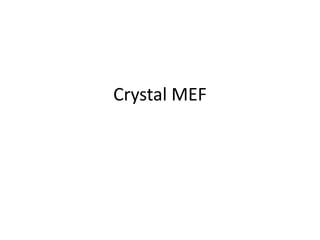Crystal MEF
- 1. Crystal MEF
- 2. Software is Hard  • Components • Extensibility – IDTExtensibility2 – ASP.NET Providers – System.AddIn
- 3. Managed Extensibility Framework • Released under .NET 4.0 – System.ComponentModel.Composition • Open source – http://mef.codeplex.com • DEMOS
- 4. 4(½) Key Concepts • Parts – A component that does something • Export – Parts that are available to be consumed • Import – Parts that a program consumes • Composition – The process by which Imports and Exports are mated together
- 5. 1. Parts • A type annotated with MEF metadata
- 6. 2. Export • [Export] on a class exposes it as a Part [Export] public class Logger() … • [Export(type)] can expose a specific type e.g. an interface [Export(typeof(ILogger) public class Logger :Ilogger • [Export(string)] can expose a named contract
- 7. 3. Import • [Import(type)] on a property makes it consume a Part public class SomeClass [Import(typeof(Ilogger)) private Ilogger MyLogger() • [ImportMany()] allows a part to import a collection (IEnumerable<T>) of parts
- 8. 4. Composition • Parts are loaded through Catalogs – TypeCatalog • IEnumerable<types> • [types] – AssemblyCatalog – DirectoryCatalog – Your custom implementation of a catalog e.g. DatabaseCatalog, DownloadCatalog
- 9. ½. Recomposition • Dynamic composition in response to a change in the number of available Parts
- 10. MEF Help • No book  • http://tinyurl.com/stackoverflowmef • Twitter – @gblock – @kathleendollard – #MEF






![2. Export
• [Export] on a class exposes it as a Part
[Export]
public class Logger()
…
• [Export(type)] can expose a specific type e.g.
an interface
[Export(typeof(ILogger)
public class Logger :Ilogger
• [Export(string)] can expose a named
contract](https://image.slidesharecdn.com/crystalmef-101111061850-phpapp01/85/Crystal-MEF-6-320.jpg)
![3. Import
• [Import(type)] on a property makes it
consume a Part
public class SomeClass
[Import(typeof(Ilogger))
private Ilogger MyLogger()
• [ImportMany()] allows a part to import a
collection (IEnumerable<T>) of parts](https://image.slidesharecdn.com/crystalmef-101111061850-phpapp01/85/Crystal-MEF-7-320.jpg)
![4. Composition
• Parts are loaded through Catalogs
– TypeCatalog
• IEnumerable<types>
• [types]
– AssemblyCatalog
– DirectoryCatalog
– Your custom implementation of a catalog e.g.
DatabaseCatalog, DownloadCatalog](https://image.slidesharecdn.com/crystalmef-101111061850-phpapp01/85/Crystal-MEF-8-320.jpg)

